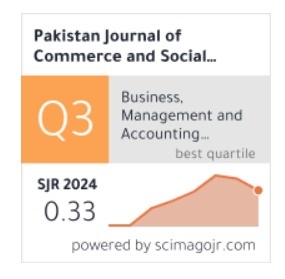Effect of Financial Inclusion, Energy Efficiency, and Human Capital on Energy Poverty in Developing Countries
Keywords:
Financial inclusion, energy poverty, energy efficiency, government expenditures, human capital, developing countries, DCCE, MMQR.Abstract
This study discovers the link between financial inclusion and energy poverty in developing nations, an area often overlooked. Using a theoretical framework, it investigates optimal associations by analyzing panel data from 45 developing countries from 2004 to 2023. Key variables include financial inclusion, energy efficiency, government expenditures, GDP, and human capital. Employing dynamic common correlated effects (DCCE) and method of moment's quantile regression (MMQR) through STATA software, the study finds that financial inclusion significantly reduces energy poverty. The variables GDP, human capital, government expenditures, and energy efficiency positively reduce energy poverty in developing nations. Analysis indicates policy measures that should improve rural financial inclusion by using mobile banking networks and microfinance institutions primarily for clean energy spending. Further recommendations include integrating financial literacy with energy initiatives, strengthening governance, and fostering private investment via transparent regulations and public-private partnerships. The study enhances understanding of how financial inclusion reduces energy poverty while helping establish suitable policies for sustainable energy development in impoverished regions.





